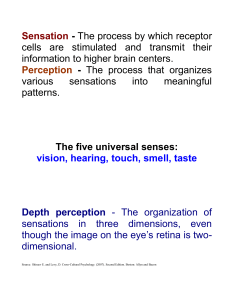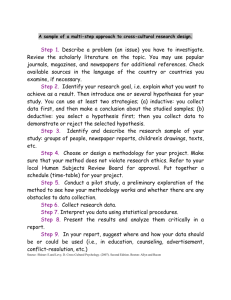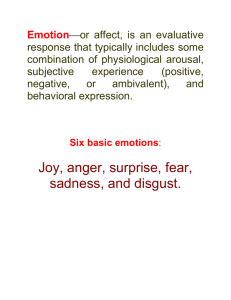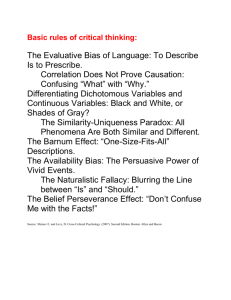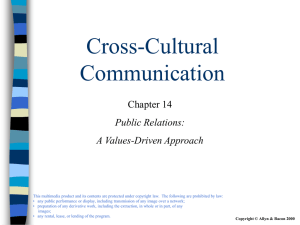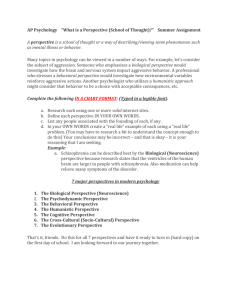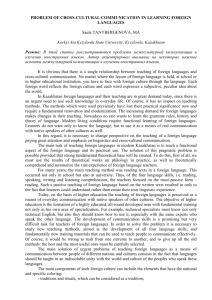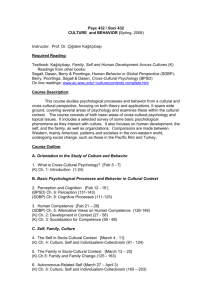Cross-Cultural Psychology: Basic Definitions
advertisement
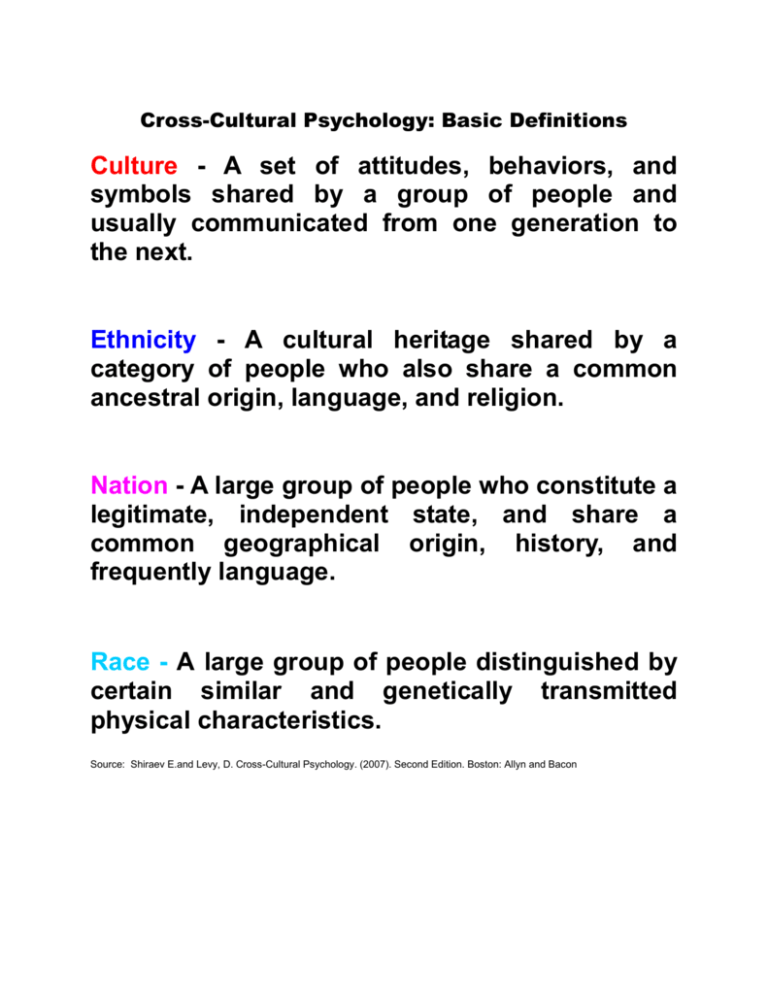
Cross-Cultural Psychology: Basic Definitions Culture - A set of attitudes, behaviors, and symbols shared by a group of people and usually communicated from one generation to the next. Ethnicity - A cultural heritage shared by a category of people who also share a common ancestral origin, language, and religion. Nation - A large group of people who constitute a legitimate, independent state, and share a common geographical origin, history, and frequently language. Race - A large group of people distinguished by certain similar and genetically transmitted physical characteristics. Source: Shiraev E.and Levy, D. Cross-Cultural Psychology. (2007). Second Edition. Boston: Allyn and Bacon Cross-Cultural Psychology: Basic Definitions Collectivism - Complex behavior based on concerns for other people (who belong to the same social group), common traditions and values, and conformity to the group norms. Individualism - Complex behavior based on concern for oneself and one's immediate family, individual achievement, responsibility, and choice. Masculinity - Complex behavior that promotes values such as heroism, achievement, assertiveness and material success. Femininity - The extent of emphasis on interpersonal goals, friendly atmosphere, consensus, modesty, caring for the weak, and quality of life. Power distance - The extent to which the members of a society accept that power in institutions and organizations is distributed unequally. Uncertainty avoidance - The degree to which the members of a society feel uncomfortable with uncertainty and ambiguity. Source: Shiraev E.and Levy, D. Cross-Cultural Psychology. (2007). Second Edition. Boston: Allyn and Bacon Traditional culture: The term used to describe cultures based largely on beliefs, rules, symbols, and principles established predominantly in the past confined in local or regional boundaries restricting mostly intolerant to social innovations Non-Traditional culture: The term used to describe cultures based largely on modern beliefs, rules, symbols, and principles relatively open to other cultures absorbing and dynamic science-based and technology-driven relatively tolerant to social innovations Source: Shiraev E. and Levy, D. Cross-Cultural Psychology. (2007). Second Edition. Boston: Allyn and Bacon Comparisons between traditional and non-traditional cultures Traditional cultures Most social roles are prescribed to individuals. In evaluations of individual behavior, the emphasis is placed on custom and routine. There is a clear distinction between good and evil in human behavior. Truth is not debatable; it is established and does not change. Individuals’ choices are restricted to the boundaries of social prescriptions. Example: premarital, extramarital, and homosexual behavior are restricted. Non-traditional cultures Most social roles are achieved by individuals. In evaluations of individual behavior, the emphasis is placed on individual choice. The distinction between good and evil in human behavior is relative. Truth is revealed through the competition of ideas. Individuals’ choices are not strongly restricted to the boundaries of social prescriptions. Example: premarital, extramarital, and homosexual behavior are generally tolerated. Source: Shiraev E.and Levy, D. Cross-Cultural Psychology. (2007). Second Edition. Boston: Allyn and Bacon U.S. Population in 2000 and 2050 (The U.S. Bureau of the Census) Race/Origin 2000 2050 All races 282,000,000 420,000,000 White, non-Hispanic 196,000,000 210,000,000 Black 36,000,000 61,000,000 Hispanic-Latino origin 36,000,000 103,000,000 Asian origin 10,700,000 33,400,000 Source: Shiraev E.and Levy, D. Cross-Cultural Psychology. (2007). Second Edition. Boston: Allyn and Bacon Four types of knowledge in cross-cultural psychology Type of knowledge Scientific Sources of knowledge Knowledge accumulated as a result of scientific research of a wide range of psychological phenomena. Popular (or folk) Everyday assumptions ranging from commonly held beliefs too individual opinions about psychological phenomena. Ideological A stable set of beliefs about the world, the (value-based) nature of good and evil, right and wrong, and the purpose of human lifeall based on a particular organizing principal or central idea. Legal Knowledge encapsulated in the law and detailed in official rules and principles related to psychological functioning of individuals. Source: Shiraev E. and Levy, D. (2007) Some major U.S. religious bodies. Numbers and assessments are based on the following sources: Yearbook of American & Canadian Churches (1999); U.S. Bureau of the Census, (2002); National Jewish Population Survey (2002); Religious Congregations and Membership (2000). When the direct count is unavailable, assessments are made by different groups based on different criteria. Religious Body Protestant (Christian) Roman Catholic Church (Christian) Muslim (all branches) Orthodox Christian (Russian, Greek, Ethiopian, and others) Jewish Church of Jesus Christ of Latterday Saints (Mormon) Buddhist Hindu Number of Members 85-86 mln. 62 mln. 1.6-4 mln. 5.6 mln. 5.2-5.6 mln. 4.2 mln. 1.8 mln. 795,000 Source: Shiraev E.and Levy, D. Cross-Cultural Psychology. (2007). Second Edition. Boston: Allyn and Bacon
